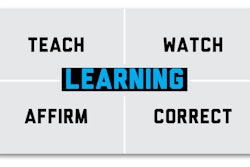
By Ray Peterson
Wouldn't it be great to hire fully trained, really savvy employees? No long orientation periods; no paying their wages and benefits while they were minimally productive; no slowing down experienced employees who have to show the new person the ropes; no having to keep watch to avoid dangerous situations. Yeah! That would be great!
But of course it's totally unrealistic. There isn't a trade school, a college, a union training program, an employee from another similar company and certainly not a government program in our world that can provide you with new hires capable of hitting the ground running and giving you a return on your investment from day one.
If you think about it there probably isn't a person out there - from dishwasher to nuclear engineer - that walks through the door fully prepared to offer maximum productivity the first day on the job. Medical doctors don't reach maximum effectiveness until they have been practicing for several years. And that's after spending seven to 10 or more years going to school. On top of that MD's never stop learning and training to stay abreast of new developments and techniques in their field. That's probably something we should be a bit thankful for. School teachers can't be certified in most states without a minimum four-year college degree along with supervised practice and frequent evaluations. Many states require public school teachers to acquire a master's degree within the first three or four years of taking a teaching job as a condition of continued employment.
We concede that driving a truck, running the paving machine, operating a motor grader, wheel loader, crawler dozer, compaction machine or many other pieces of equipment is not brain surgery. But that does not for a New York minute demean the skills required to do so many of the vital and often dangerous jobs in construction and paving work.
In an active repaving job think about the planning and knowledge needed to set up traffic flows to meet state and/or federal standards to minimize the inconvenience to impatient motorists and keep the paving crew safe and productive. Bid specialists, job superintendents, planners, foreman, equipment operators, laborers, truck drivers and all types of support personnel have developed specialized skills and knowledge through education, coaching, experience and formal and informal training to become efficient in their field. They never really stop learning …we hope! Equipment operator skills need to be upgraded with each technological advance in equipment. And that requires some form of training. Failing to upgrade skills can lead to some pretty expensive lessons.
About 15 years ago Dr. Roger W. Liska, former head of the Department of Construction Management and Science at Clemson University was involved in a study to better understand why some contractors don't train. The study identified the following eight major reasons why some contractors say they don't train.
- Lack of money. Most of those who responded this way had never researched the cost of training or established a training budget. So they didn't really know how much money some form of training would cost.
- Lack of time. Many contractors did not consider the time they actually spend doing on-the-job training and continuous coaching as training time.
- Lack of knowledge. People who have never developed or conducted formal training are often intimidated by the prospect. For those who see the value of training and want to do it; help is out there in many forms. There are private companies -- such as VISTA Training, the employer's insurance company, and even local equipment dealers -- who offer some form of training relating to their products.
- Turnover. An interesting thing Dr. Liska's study turned up was that employers who had an ongoing training program reduced employee turnover by an average of 18%. It seems that employees who viewed their employer as caring enough to train them felt more valued and were more inclined to stay with their current employer.
- Workforce too small. The study didn't say what "too small" was, but if one employee in a four-person operation had an expensive or fatal accident due to not being trained in how to correctly or safely perform their job we can probably conclude that no workforce is "too small" to benefit from training.
- Past efforts not effective. The study didn't indicate what "past efforts" consisted of or what the "effectiveness" measure might have been. But we suspect that past efforts might not have been well thought out and planned; and measuring effectiveness requires establishing a starting point to measure progress.
- Hire only trained workers. Trained in what, by whom and how? What verification existed of prior training or was the good-faith word of the new hire who claimed to be trained because they wanted the job simply accepted? Did prior training involve the policies and practices and rules of the new employer? We need to evaluate some of these "trained workers" before we pass judgment on this one.
- Lack of employee interest. The study clearly indicated that when the employer showed a good-faith effort to do training the employees responded in-kind.
The above comment is based on the following little gem that practically jumped out of this study:
"Training results in an average rate of return on investment of 2:1; an average increase in productivity of 18%; and average reduction in employee turnover of 18%."
"The study concludes that many contractors aren't committed to training their employees because they aren't aware that such a program "will result in a positive return on investment for the company."
"The study found that contractors who do train effectively invest an average of 2.5% to 3% of their payroll to train all levels of personnel. In return, they are more effective, productive, and less hampered by absenteeism."
And the final gem that came out of this study was: "No studies were found that suggested there are any disadvantages to training."
This is all sort of interesting, but if you've never had a regular training program in your company the above information is not intended to make you think you can just say, "Okay, I'm sold! Let's go train our employees!" When it comes to training there are no magic wands that will just make it happen. Effective training is highly dependant on the trainer. It has been said; "If you want to really understand a subject …teach it!
Teaching can be pretty intimidating if the teacher is not well prepared. And if the lessons taught are going to be effective they need to be:
- Relevant to the audience,
- Interesting,
- Well presented, and above all,
- Honest and believable.
The supervisor with 30 years of on-the-job experience might have forgotten more than most of these new hires will ever learn. But if the experienced supervisor doesn't have the skill to effectively transfer that knowledge everyone's time is being wasted.
Regardless of the size of the company seeking outside specialized help might be the best way to meet internal training needs, improve employee morale, and reduce employee turnover and increase work safety and efficiency. Also, having good training records in the event of an accident may save a lot of grief from OSHA and the insurance company.
So what's the big deal about training? If you can believe the study by Dr. Liska the big deal is getting a 2:1 return on an investment in training. There aren't many investments you can make that will bring that kind of return to the bottom line. The trick is to do it right and for that it might require some outside help. Don't be shy, pick up the phone now and start the process before the season gets rolling.
Ray Peterson and VISTA Training offer creative, high impact training programs and services for a variety of construction equipment. For more information call 800-942-2886, visit www.vista-start-smart.com or send an e-mail to [email protected].


















